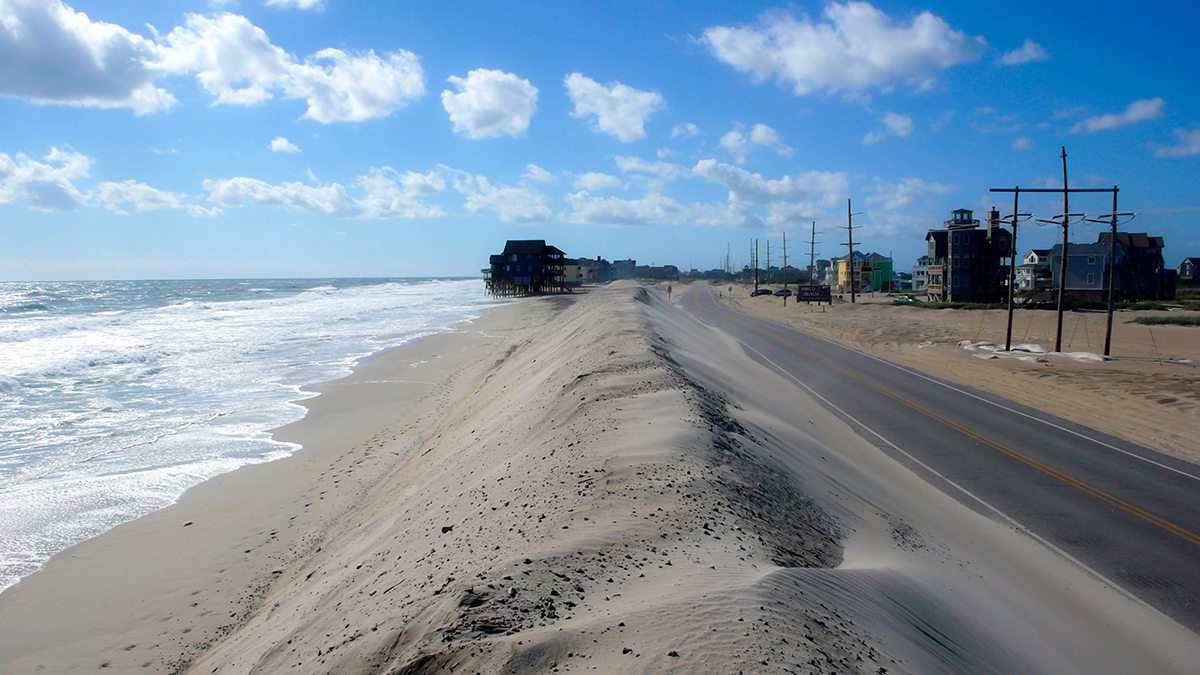New UNC-Chapel Hill center helps prepare North Carolina for increasing environmental threats
The Center for Resilient Communities and Environment is working with North Carolina communities to understand their vulnerability to natural stressors and help them develop strategies to strengthen their community’s resilience.

Preparing for a hurricane is more than just last-minute modifications and taking temporary measures to protect lives and property. It requires complex long-term planning that examines nearly every aspect of a community, from establishing proper building codes to determining where developers can build homes and businesses.
“It’s about building capacity to look into the future to anticipate the risk and then be able to reduce your vulnerability and recover into healthier, less vulnerable and more equitable places rather than recover — but worse than before,” said Philip Berke, a research professor in Carolina’s Department of City and Regional Planning.
 A new center, led by Berke, at Carolina’s Institute for the Environment is helping communities better prepare and plan for hurricanes and future risks posed by climate change. The Center for Resilient Communities and Environment will work with North Carolina communities to understand their vulnerability to natural stressors and help them develop strategies to strengthen their community’s resilience.
A new center, led by Berke, at Carolina’s Institute for the Environment is helping communities better prepare and plan for hurricanes and future risks posed by climate change. The Center for Resilient Communities and Environment will work with North Carolina communities to understand their vulnerability to natural stressors and help them develop strategies to strengthen their community’s resilience.
“This new center will provide critical information to improve decision making by all stakeholders,” said Mike Piehler, director of the UNC Institute for the Environment. “A community-based research approach, considering the social and natural systems as necessarily linked, will be the hallmark of this transdisciplinary effort.”
The center, which launched this spring, will pull together marine scientists, geographers, city planners and public health professionals to understand the new challenges climate change presents, and then translate that research directly to local governments to develop thorough long-term plans that will help communities adapt in the face of the increasing environmental threats.
That outreach and engagement with the communities are at the core of the center’s mission, said Berke.
“Our society is in a position of knowing more, but losing more. So, we don’t want to do research that can only be understood by the scientists and the engineers. We’re trying to provide the research so that it can be taken up at the local level,” he said. “Better hazard maps and more refined forecasts will be important, but they will not necessarily reduce damages unless data is translated in ways that equip people with knowledge they can use. We believe that we have to engage communities and work with them.”
Bringing the information to the communities can ultimately save lives and money by helping local officials develop thorough and coordinated local development plans that examine all planning sectors, including land use, economic development, affordable housing and transportation through the lens of environmental resiliency.
To lead the center in these efforts, Berke will draw on his years of experience helping communities evaluate and coordinate local plans that reduce risks from current natural hazards and future climate change through his Plan Integration for Resilience Scorecard project.
“Phil is an internationally renowned resilience researcher and problem-solver,” Piehler said. “He is an effective team builder and a fantastic colleague who makes everyone around him better. I am thrilled to have him leading this new center.”
With the Resilience Scorecard program, Berke and his students have worked with 14 cities around the world to break down the siloed plans from various community stakeholders and officials and work toward the singular goal of community resiliency. The project was developed with financial support from the National Science Foundation and the Department of Homeland Security’s Coastal Resilience Center, which is based at UNC-Chapel Hill.
“We geographically stack the plans on top of each other, and we’re able to look at the neighborhood-scale where the plans work together and where they work against each other,” he said. “We want to be able to make plans to anticipate and collaborate and work together, but part of that planning is the implementation.”
Berke now plans to bring the same process to the Center for Resilient Communities and Environment to help North Carolina plan for the uncertainty of future hurricanes by assisting local officials on how to address vulnerabilities and adapt before it’s too late.
“You’re never going to be perfect, but you’re anticipating and trying to organize about how you might adapt and understand what kind of information, roles and responsibilities you need to make those adaptations,” he said. “That’s very hard to do in the middle of everything. If you’re taking ad hoc reactions, rather than proactively planning and managing, it’s a very different outcome that you’ll get.”




